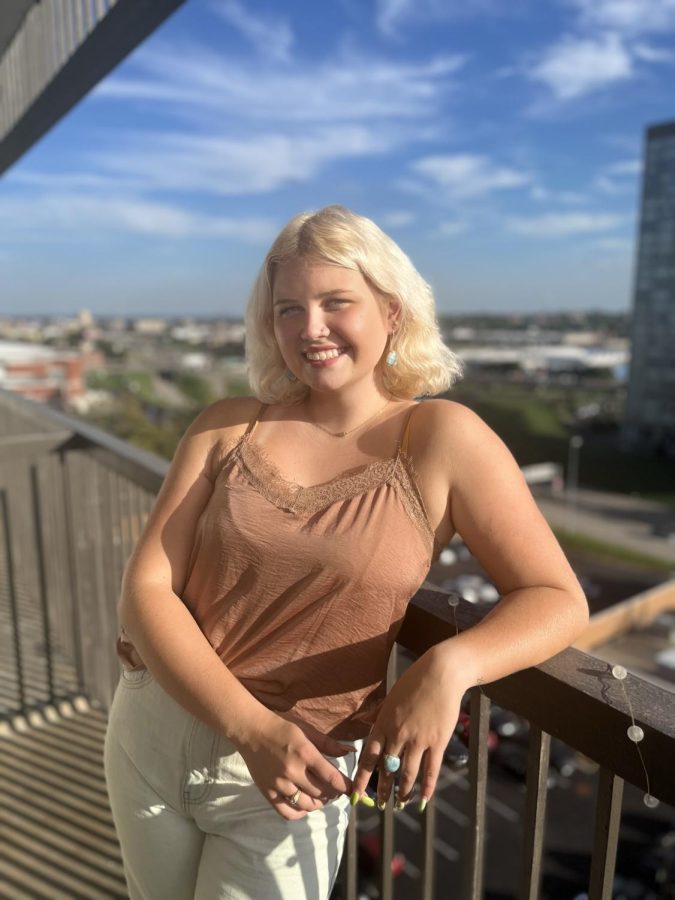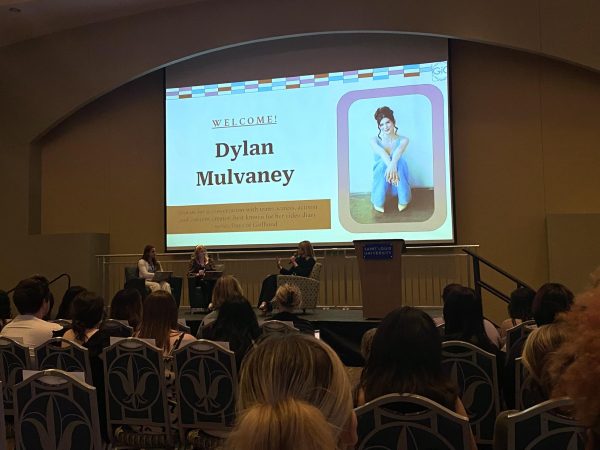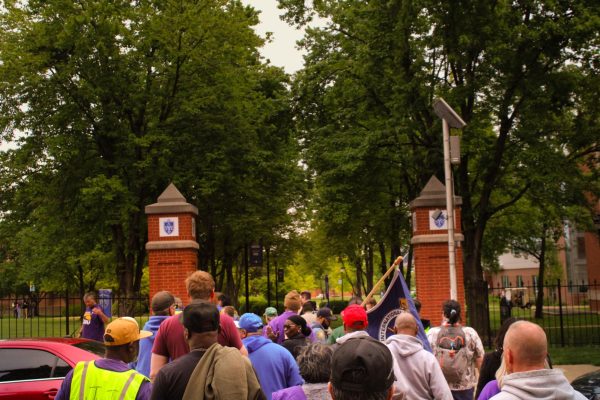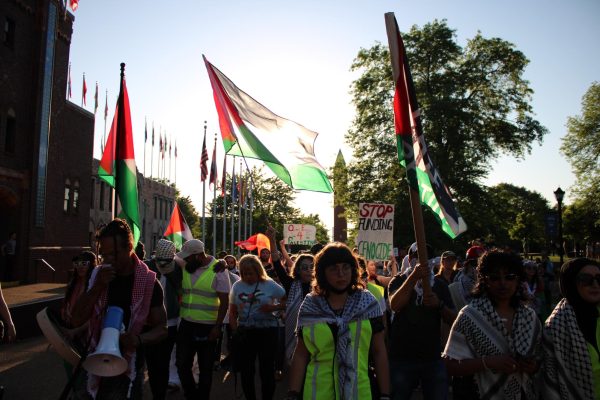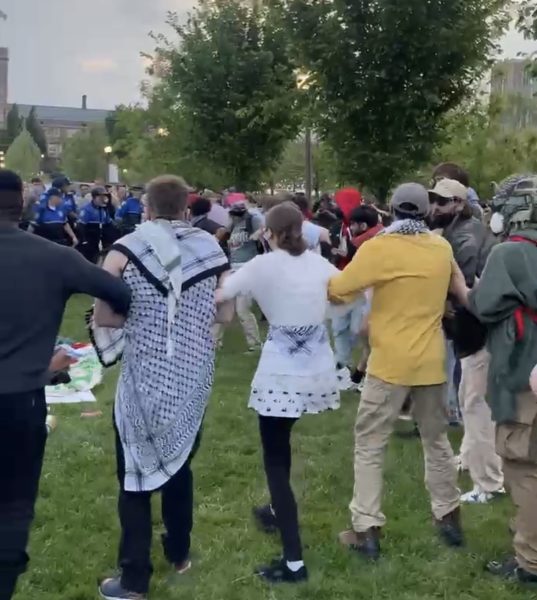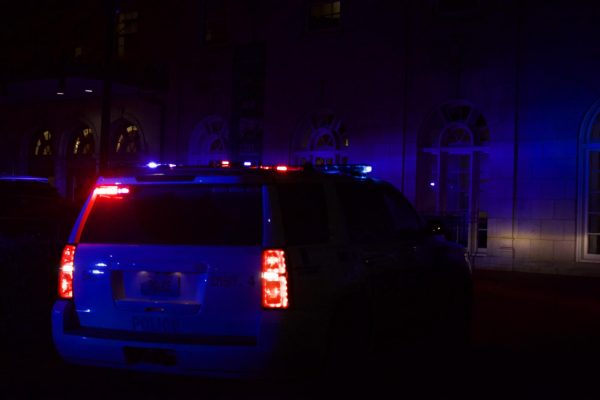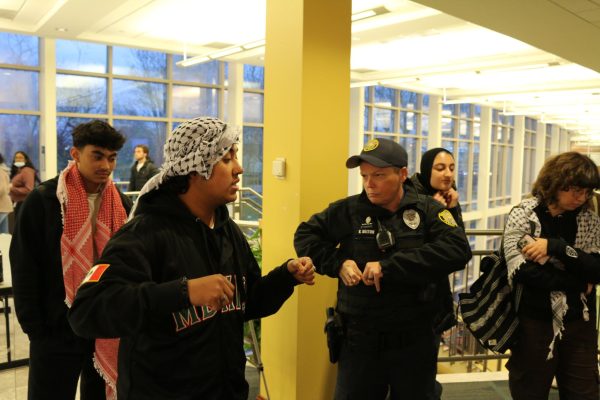The War on Ukraine: From the Perspective of SLU Sophomore
Since the start of the Russo-Ukrainian War on Feb. 24, sophomore Mariya Yasinovska has been diligently following the news of her home country Ukraine. An English major at SLU and an aspiring author, she was born in Cherkasy, a city around 100 miles south of Kyiv, the capital. She moved to St. Louis last year when she began attending SLU. Her family currently lives in Iowa. Yasinovska says she remembers vividly the day Russian President Vladimir Putin announced the military operation in Ukraine in February of this year.
“I remember exactly how I felt. I remember my vision going black for a few moments, because I was terrified of what this would mean. It was really hard to keep going about my day and going to classes because I felt like my world was ending. Honestly, that was one of the hardest days of my life,” Yasinovska said.
Since early in the invasion, Ukraine has been effective at repelling Russian attacks. More recently, they have gradually taken back many of the occupied territories. On Nov. 11, they forced Russian troops out of Snihurivka, a town in the Southern region of Kherson. But, the military remains alert as they fear Russian troops could be taking time to reorganize for eventual reoccupation. Yasinovska has held an optimistic, persevering attitude through various phases of the war. “Ukraine will win this war.
After nine months of fighting, that much is clear – Russia thought Kyiv would fall in a day. Putin expected Ukraine to be weak, but now it’s the Russian government giving up occupied territories and cutting its losses,” Yasinovska said. In total, the Ukrainian military has forced the Russians into three major retreats, according to The New York Times’ article, Tears of Relief as Ukrainian Soldiers Move Back Into Kherson, “from north of the capital Kyiv, last spring; from the northeastern Kharkiv region in late summer; and now from at least portions of the western bank of the Dnipro River in the south.” Human Rights Watch has documented several cases of Russian military forces committing war crimes against civilians in occupied areas. Russian news reporters continue to justify their aggressive, inhumane behaviors as necessary by calling Ukrainian citizens “neo-Nazis” and “terrorists.”
According to a platform run by Russian and Ukrainian journalists called Meduza, on Nov. 15, a Russian journalist was fined for “discrediting” the Russian army when saying, “You can’t send a woman to the front.” The official ruling was that a “front” can only exist in a war, and since it is a “special military operation,” it must be referred to as a “line of contact.” This displays the Russian government’s refusal to acknowledge it as a true war and the censorship it places on its people. Those who have spoken out and protested the issue have been arrested, tortured and, in some cases, murdered by their government.
An article published by Human Rights Watch states that “Russian authorities have arbitrarily arrested thousands of peaceful protesters at anti-war rallies across Russia, in line with their increasingly brutal crackdown on those who disagree with Russia’s military offensive in Ukraine.” The director added, “Russian authorities continue to deny people the right to freedom of assembly and stifle the voices of those who disagree with Russia’s war in Ukraine. The escalating police violence illustrates the length to which Russian authorities will go to intimidate and silence dissent.” This magnifies President Putin’s acts of terror as it highlights how unpopular this war remains within Russia. Many Russian people, who have stood against this war from the very beginning, have fled to avoid being drafted. According to an article from Meduza, the mother of a man named Andrey Marchuk, who received draft orders in late September of this year, said, “In Zaitseve. Luhansk region. Troitske district. They took them to a hole there. There were no amenities in the hole. A lot of guys there, they said, who don’t want to fight. Refusers. They pressured them and pressured them, they’re not signing anything. They don’t want to fight. What is there to fight for, and with who?”
Russia’s actions have become a true humanitarian crisis and continuously defy universal moral laws. President Putin hides his true intention to establish a broad, Russian-dominated security zone resembling the power Moscow wielded in Soviet days through his insistence that Ukraine is fundamentally part of Russia, culturally and historically, according to a New York Times article. “Having family both in the United States and in Ukraine makes it easy for me to always be in touch with my culture and feel connected to my heritage,” Yasinovska said. “We speak Ukrainian at home. Always.” Yasinovska says her family has helped to preserve her relationship with her culture. “Now that I’m in college, I still wear traditional Ukrainian clothes for Christmas and Easter suppers when I go home. I still call my grandparents and my family,” she added.
This war has affected, and continues to affect, millions of people in Ukraine through forced evacuation, electrical outages due to drone attacks, devastation through bombings, or the rape, torture and slaughter of innocent civilians. Although it appeared that Russian troops only looted buildings recently in the town of Snihurivka, they continue to commit heinous acts of terror in other regions of the country. “The majority of my family still lives in Ukraine…my grandparents and aunt and uncle’s family still live there. It’s been very difficult watching my grandparents go through this war. They have both already been through so much, and I wish so much I could visit them and hug them both right now. They always stay so positive, but their lives have not been the same since February 24th, and will never be the same again,” Yasinovska said.
Globally, the war impacted various countries, mainly through gas prices and the cost of imported goods. U.S. and European financial penalties have been throttling banks and other businesses in Russia, limiting the Russian government’s ability to use its enormous foreign currency reserves. A New York Times article notes that President Biden’s sanctions have prevented Russia from importing American technology critical to its defense. Ultimately, global disapproval of Mr. Putin’s aggressive acts has helped foster a united front. “A lot of people try to make the war into something political or economic. But there are people dying every day. Soldiers, civilians, mothers, children,” Yasinovska said. “There are over seven million displaced Ukrainians, and that number keeps rising.” The best way to stay informed, Yasinovska says, is by digging deeper than Twitter threads and social media headlines and instead getting the news from more credible and accurate sources, including Ukrainian outlets. “There are many popular US news outlets that are not always accurate when reporting about the war,” Yasinovska said. She adds that there are ways to also support Ukrainians.
“Support Ukrainians by engaging with their art, their online small businesses and their online presence. Support Ukraine by supporting the people who have lost so much in this war,” Yasinovska said.
Your donation will support the student journalists of Saint Louis University. Your contribution will help us cover our annual website hosting costs.


